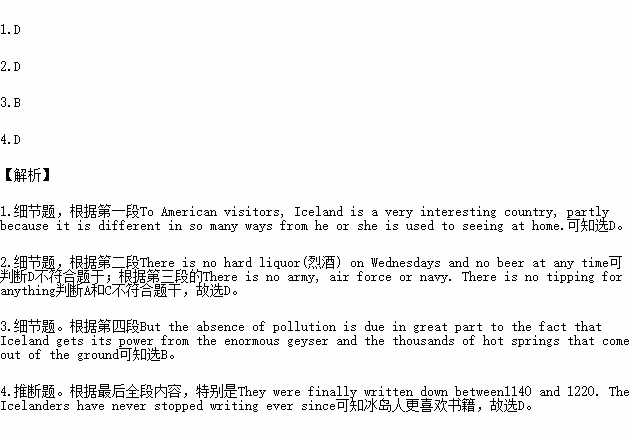题目内容
A
To American visitors, Iceland is a very interesting country, partly because it is different in so many ways from he or she is used to seeing at home. There are quite a few things that are not done, or that do not exist on the island---quite a few “No’s”.
There is no pollution, for instance, No dogs are permitted in Reykjavik, the capital. There is no television on Thursdays or during the entire month of July, and only three hours of black-and-white TV the rest of the time. There is no hard liquor(烈酒) on Wednesdays and no beer at any time. There is no handguns; only one jail of thirty-five cells(狱室)in the entire land---an admirable figure, even for a small country of 313,376 people.
There is no army, air force or navy. There is no tipping for anything. There are no large stores open on Saturdays or Sundays. Since Iceland is situated just under the Arctic Circle, there is no darkness in summer and no daylight in winter. But thanks to Culf Stream, the climate is rather mild, with temperatures ranging from 34 degrees to 52 degrees in July.
The rules on television liquor and guns are the result of government decisions. But the absence of pollution is due in great part to the fact that Iceland gets its power from the enormous geyser and the thousands of hot springs that come out of the ground. They provide all the energy needed by the country. In fact, Iceland uses only 3 percent of all its available power.
Iceland has been described as a democratic independent country where more fish are caught and more books published per person than anywhere else in the world. The Icelanders have always felt a particular love for literature. They composed their first books in the ninth and tenth centuries AD. These works were poems and tales about the kings, heroes, and heroines of Iceland and Norway. At first, the stories were memorized and passed from generation to generation. They were finally written down between1140 and 1220. The Icelanders have never stopped writing ever since. “Rather shoeless than bookless,” they proudly say.
1.American visitors enjoy visiting Iceland probably because_______.
A. no dogs are permitted in the capital
B. the police do not carry handguns
C. the climate is rather mild
D. it is very different from America
2.The following statements are true EXCEPT________.
A. there are no soldiers in Iceland
B. the Icelanders don’t drink beer
C. there is no tip of any kind
D. there are no crimes in Iceland
3.There is no pollution in Iceland mainly because_______.
A. Iceland uses only 3 percent of all its available power
B. the Icelanders use hot water from the ground below as their energy
C. it is located just under the Arctic Circle
D. it is a democratic independent country
4.“Rather shoeless than bookless” means_______.
A. they prefer not to have shoe or books
B. they would rather have shoes on than write books
C. they prefer travelling to reading
D. they regard books more important than shoes.

